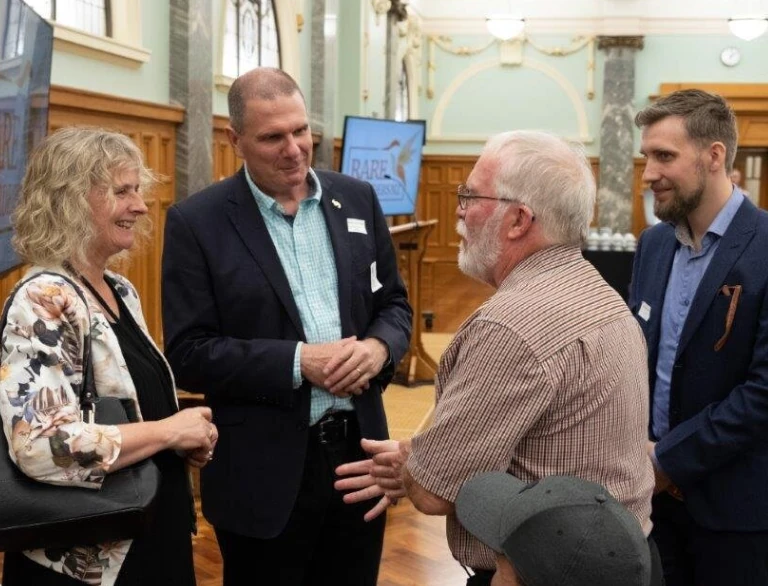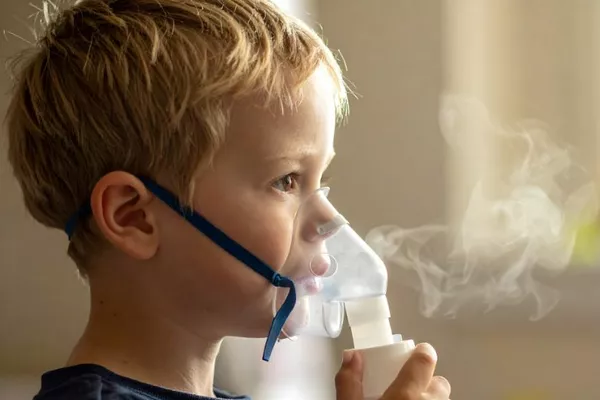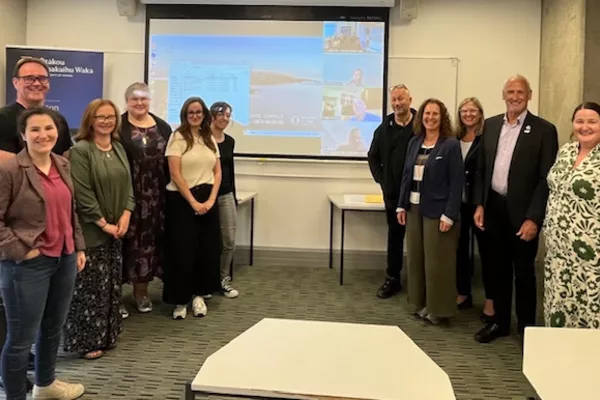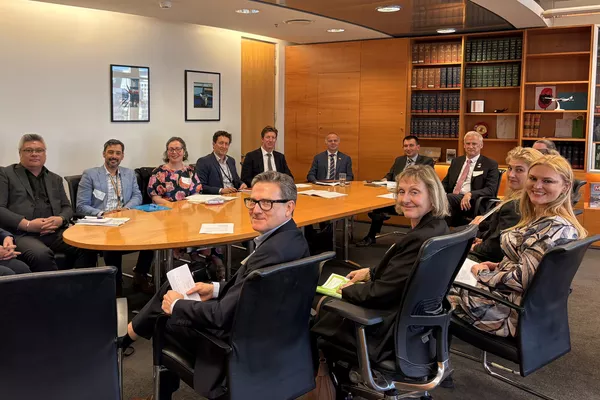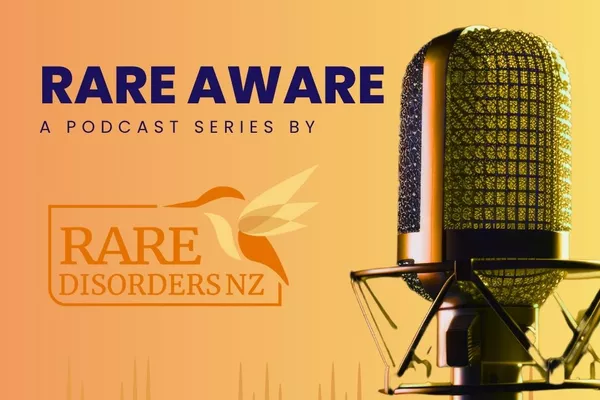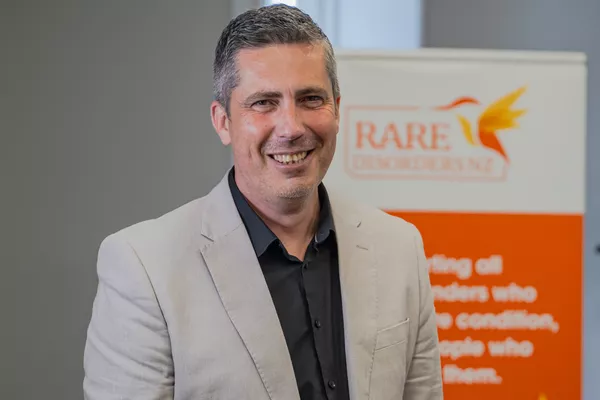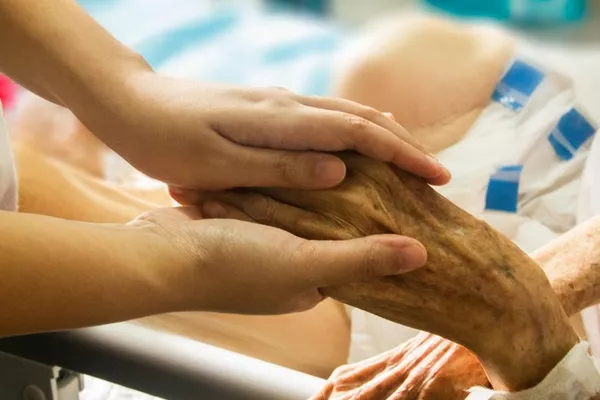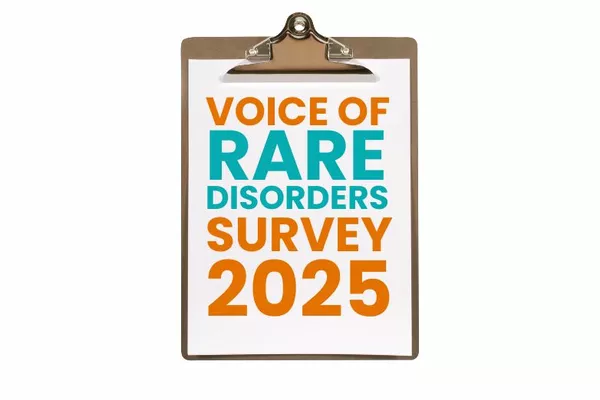7 priority areas for rare
Strategic priorities to improve health and wellbeing for people living with a rare disorder
Improving care for rare
In 2019, the Rare Disorders NZ collective identified the following seven strategic priorities to improve health and wellbeing for people living with a rare disorder.
These priority areas were reaffirmed following the release of the Rare Disorders Strategy in 2024. They will remain our focus, with the intention of being informed through a te ao Māori lens, as we embark on the implementation phase of the Rare Disorders Strategy.
DIAGNOSIS
Early and accurate diagnosis of rare disorders
PLANNED PATHWAYS FOR CLINICAL CARE
Coordinated and integrated pathways for cohesive healthcare
ACCESS TO DISABILITY AND SOCIAL SUPPORTS, INCLUDING SUPPORT FOR CARERS
Implement simple mechanisms to ensure appropriate access to disability and social supports
RARE DISORDER MEDICINES
Equitable access to modern rare disorder medicines through a specific assessment pathway
RESEARCH
Coordinated and funded programme of research for rare disorders
DATA COLLECTION
Code and capture relevant data on rare disorders in New Zealand
WORKFORCE DEVELOPMENT
Planned training on rare disorders for health professionals and support staff
DIAGNOSIS
We will advocate for health entities to ensure early and accurate diagnosis of rare disorders through:
- Equitable access to a range of diagnostic tools/tests, supported by policy.
- A newborn screening program which is robust and funded to keep up with international best practices and availability of new medicines.
- Providing a pathway for carrier testing. This involves testing people who are known to be at increased risk of being carriers of a specific inherited disorder. This may be because a relative is known to be a carrier or has the condition or certain genetic conditions might be more prevalent in their community.
- Providing a pathway for genetic testing once a patent presents with undiagnosed symptoms.
- Putting protocols in place to identify people with no diagnosis, ensuring that a lack of diagnosis does not create a barrier to treatment.
- Making high-quality diagnostic tests accessible through common, clinically agreed systems or pathways.
- Developing policy that supports timely and equitable access to new and emerging health technologies.
- Equitable access to peri-conception genetic testing and counselling for those with an increased chance of being carriers of rare disorders.
This aligns with the following points in the Strategy:
- Over time, new capabilities will be introduced into the system to speed up diagnosis and allow earlier preventive care.
- New genomic testing for suspected rare disorders will speed up diagnosis, especially for infants and children. Rapid DNA sequencing will allow precise identification of a genetic disorder from among several thousand possibilities, rather than testing for one at a time.
- The capability and service infrastructure to support early testing and preventive care will be built over time. Horizon scanning will inform early work to prepare for possible introduction of developing technologies and capabilities that can potentially benefit people with rare disorders.
- Adaptation to the Aotearoa New Zealand context may include negotiating pathways for referrals, consultations and care transfers across different levels and different service lines in the health system. It may include guidance on when to refer for highly specialised care or how to apply, in exceptional circumstances, for access to tests, treatments or forms of care that are not usually available.
- Regulation of new technologies, digital capabilities, medicines, devices and other therapeutic products can support safe and timely access to diagnosis and effective treatments.
PLANNED PATHWAYS FOR CLINICAL CARE
We will advocate for health entities to deliver co-ordinated and integrated pathways for cohesive healthcare by:
- Developing a care pathway for rare disorders including diagnosis and genetic testing for people with unusual co-presenting undiagnosed symptoms.
- Developing standards of care documents for specific rare disorders to be implemented within the health system.
- Delivering services which seamlessly support people living with a rare disorder through life-stage transitions, including from childhood to adolescence, and on to adulthood and older age.
- Targeting awareness and education for people in their preparation for conception and pregnancy.
- Identifying people with unusual co-presenting undiagnosed symptoms for priority access to a specialised diagnostic response.
- Coordinating rare disorder care and support that is integrated, while being person and family-centred.
- Implementing clearly coordinated pathways throughout health, disability and other systems.
- Ensuring that rare disorder care and support systems address mental health and wellbeing.
- Promulgation of guidelines that address the specific needs of people unusual co-presenting undiagnosed symptoms.
This aligns with the following points in the Strategy:
- Responses to rare disorders are currently in different service lines and pockets across our health system. The new system will build on these responses and connect them up.
- Leadership and coordination mechanisms will oversee the work of adopting elements that together make a coordinated and responsive system. These elements will include:
- diagnostic, referral, navigation and care standards, guidelines and pathways
- capability development reports and initiatives
- recommendations for service and system enhancements.
- The kinds of leadership and coordination mechanisms chosen will ensure sustainability for the long term.
- Standard care provision will adapt, adopt and assimilate clinical guidelines and pathways for rare disorders. A programme or process will be established to identify, adapt, authorise and publish guidelines, standards and pathways for rare disorders in Aotearoa New Zealand. The programme or process may start with rare disorders for which a national service or similar well-established approach is in place and move on to continually expand sets of tools to support care quality for increasing numbers of rare disorders.
- Adaptation to the Aotearoa New Zealand context may include negotiating pathways for referrals, consultations and care transfers across different levels and different service lines in the health system. It may include guidance on when to refer for highly specialised care or how to apply, in exceptional circumstances, for access to tests, treatments or forms of care that are not usually available.
- Over time, published tools will be integrated with standard reference sources and patient management systems.
- The system will also support experts in care for rare disorders to help and advise practitioners.
- Specialist experts will need capability development that enables their ongoing learning for the role. Also important will be cross-specialty learning about how backup and advice functions best cultivate the provision of high-quality and confident care.
- Rare disorders programmes, networks, centres and other efforts have existed for some years in a range of countries. Many countries use guidelines, decision trees, referral and care pathways and similar tools based on or generating evidence of good outcomes for people with rare disorders. A programme to adapt the most relevant tools for Aotearoa New Zealand will support easier and more widespread access to good care.
- Findings from current evaluations of the European Union’s virtual networks of health care providers will generate new information on ways to share and concentrate knowledge and resources in order to make highly specialised care accessible.
ACCESS TO DISABILITY AND SOCIAL SUPPORTS, INCLUDING SUPPORT FOR CARERS
We will advocate for health and other government entities to implement mechanisms to ensure appropriate access to disability and social supports, including support for carers by:
- Ensuring those with unusual co-presenting undiagnosed symptoms are included.
- Developing an easily accessible pathway to information on support services available to those with a rare disorder.
- Developing a pathway for those with a rare disorder within the education system.
- Developing a pathway for those with a rare disorder leaving the education system.
- Removing the administrative burden of proving the disorder is ongoing for conditions that are lifelong.
- Ensuring that people with rare disorders that include both health conditions and disabilities and/or hidden disabilities are able to access support that is comparable to people who have an isolated or more visible disability.
- Continue to work with Carers Alliance to support advocacy work for the rights of carers.
We advocated for the Strategy to acknowledge the impact rare disorders have on every aspect of life, not just on health. Living with a rare disorder impacts finances, education, workforce participation, as well as everyday life tasks.
We are disappointed this wider lens was not taken in the Strategy. However, we will continue to work with respective government agencies to ensure that people living with a rare disorder are taken into consideration in system investments and policy development, and that consideration is given to establishing pathways to recognise the unique needs and challenges of the rare community.
RARE DISORDER MEDICINES/DRUG ACCESS PROGRAMME
We will advocate for health entities to provide equitable access to modern rare disorder medicines through a specific assessment pathway including:
- Future-proofing a pathway for new and innovative modern medicine for those with a rare disorder, for example gene therapy.
- A change in Pharmac's statutory objectives to add the objective to secure pharmaceuticals in ways that have regard to the resulting wider societal and economic benefits, allowing the factors considered in cost-benefit analyses to include the wider health system, social support system, and society costs and benefits.
- Funding PHARMAC so that it is able to fund new and innovative modern medicines in a way that is consistent with best international practice
- Developing and implementing a medicines strategy or similar to include rare disorders, gene therapy and innovative modern medicine.
- Developing and implementing policy that supports timely and equitable access to new, emerging and best available health technologies.
- Ensure people with a rare disorder have equitable access to medicines with demonstrated clinical benefit for a rare disorder
- The rare voice is routinely heard and appropriately valued and incorporated within the assessment pathway
- Appropriate clinical expertise is sought and incorporated into the assessment pathway, including utilisation of international experts when there is not a New Zealand clinician who is an expert in the rare disorder.
This aligns with the following points in the Strategy:
- An early goal of the work will be to improve and clarify how and when people with exceptional health needs or circumstances can access tests, advice, medicines, devices and other treatments that are not generally available. They may be highly expensive or require travel to other parts of the country or the world.
- A programme of work across health entities will be concerned with improving the quality and timeliness of decisionmaking on access to diagnostic, preventive and treatment services, products and infrastructure. This work will include a particular focus on rare disorders.
- We will actively support international efforts to make it easier, faster, safer and more affordable to use new diagnostics, treatments and technologies for rare disorders.
- Over time, this programme of work will consider how to improve aspects of care such as....fairness across different types of investment (such as in medicines, new services, overseas treatments) [and] fairness across different types of need (such as rare or common, prevention or treatment, ongoing or once-only, urgent or non-urgent, providing a cure or relieving symptoms).
- Aotearoa New Zealand’s regulatory stewardship programme will review relevant legislation and regulatory frameworks to ensure they support rare disorders outcomes. Regulation of new technologies, digital capabilities, medicines, devices and other therapeutic products can support safe and timely access to diagnosis and effective treatments. Flexibility will be required for the appropriate level of scrutiny and safety precautions for a range of different rare disorder scenarios. Aligning Aotearoa New Zealand’s regulatory approaches with those of like-minded countries will reduce timeframes for assessment.
RESEARCH
We will advocate for health and other government entities to deliver a coordinated and funded programme of research for rare disorders including:
- Development and implementation of a national research strategy for rare disorders.
- Development and implementation of a pathway for those with a rare disorder to participate in both national and international research.
- Robust investment in rare disorder research in New Zealand.
- Translation of research and innovation into clinical care and vice versa so that clinical care informs research and innovation.
- Partnerships between researchers and clinicians in research into rare disorders.
- Clinical teams’ collection and recording of data, contributing to research and evidence-building.
- Involvement of Māori and Pacific peoples at every level of development, implementation and governance of genomic research as per Te Mata Ira18 guidelines.
- Development and implementation of policy which maintains sovereignty for Māori over their health data to ensure that Māori and iwi aspirations are realised.
This aligns with the following points in the Strategy:
- The health research infrastructure will support rare disorders research and evaluation.
- An expanded infrastructure will support researchers to conduct and people to participate in research on health and health services. Rare disorders research will become a key component of these activities. This will include research and evaluation of services and systems for rare disorders, along with measuring their outcomes, effectiveness and value for money. Important activities to support growth in particular research areas over time will include:
- building support infrastructure for clinical trials, which will increasingly enable people from any part of Aotearoa New Zealand to participate in clinical trials led here or elsewhere
- developing methodology to measure and more accurately value a wider range of benefits and costs to people and their whānau living with rare disorders, and applying the methodology to support decision-making on investments and access
- evaluating service development and improvement programmes and other initiatives to improve responses for rare disorders
- including rare disorders information in the Stats NZ Integrated Data Infrastructure, where possible, to help us learn how wider social determinants link with health outcomes.
- People with rare disorders will, in time, be more able to participate in international clinical trials.
- As our clinical trial infrastructure further develops, it will support New Zealanders to participate in international rare disorders clinical trials. Clinicians involved in trials will receive backup and research support where their patients are participants in suitable funded trials, even when there are very few potential participants from Aotearoa New Zealand.
DATA COLLECTION
We are advocating for health, disability, education and other government entities to capture relevant data on rare disorders in New Zealand. This will include.
- Embedding Orphanet Coding (ORPHACODES) or an internationally recognised equivalent into the health system. This can/should be done in a way that is compatible with other key coding systems (e.g. SNOMED, ICD-10/11)
- Supporting the availability of computerised prompts to help GPs diagnose a rare disorder when a rare disorder has not previously been considered.
This aligns with the following points in the Strategy:
- National health datasets will be able to routinely collect rare disorder information.
- The level of diagnostic information that can be readily searched and reported on will become fuller and more detailed over time.
- Clinical classifications will become increasingly detailed as more advanced classification systems are incorporated in national data collections. Classification systems will need to grow in specificity and be able to connect easily to supplementary datasets specific to rare disorders.
- Ways of capturing suspected but unknown rare disorders will need to be developed. General (including ‘unknown’ or ‘unspecified’) codes may be considered for interim use where more specific categories are not yet available or applicable.
- Methods to link high quality rare disorder information where clinical coding is not yet available will be developed to connect with national health data.
WORKFORCE DEVELOPMENT
We will advocate for health, disability, education and other government entities to plan and provide training on rare disorders for health and other professionals and support staff which will include:
- Creation of effective rare disorder clinical networks that connect to international research and best practice.
- Developing and implementing pathways to work with international partners.
This aligns with the following points in the Strategy:
- In future education programmes, health practitioners will learn more about rare disorders in general, about being responsive to unusual needs and about finding further information.
- Curricula for health practitioner education at all levels will be revised over time to draw attention to rare disorders more frequently. Examples will canvass the impacts of rare disorders and the benefits of identifying and providing the right care earlier. As diagnostics, clinical guidelines and care pathways are developed, students will learn how to access the information they need to support care.
- Learning modules for rare disorders will become widely accessible over time.
- Health workforce learning opportunities in rare disorders will be increasingly available and become more sophisticated. Learning modules will include offerings on rare disorders specifically as well as more general offerings that include rare disorder content. Rare disorder examples will feature in an increasing portion of health workforce learning opportunities and increasingly in competency-based learning.
- Learning opportunities relevant to caring for and supporting people and their whānau living with rare disorders will become widespread. Rare disorder examples will be included in an increasing portion of learning opportunities related to tikanga practices, cultural safety and competency, care and support, counselling and social wellbeing.
Read more about the Rare Disorders Strategy here.
Read more about Rare Disorders NZ's recommendation for a Rare and Undiagnosed Disorder Centre of Expertise here.



